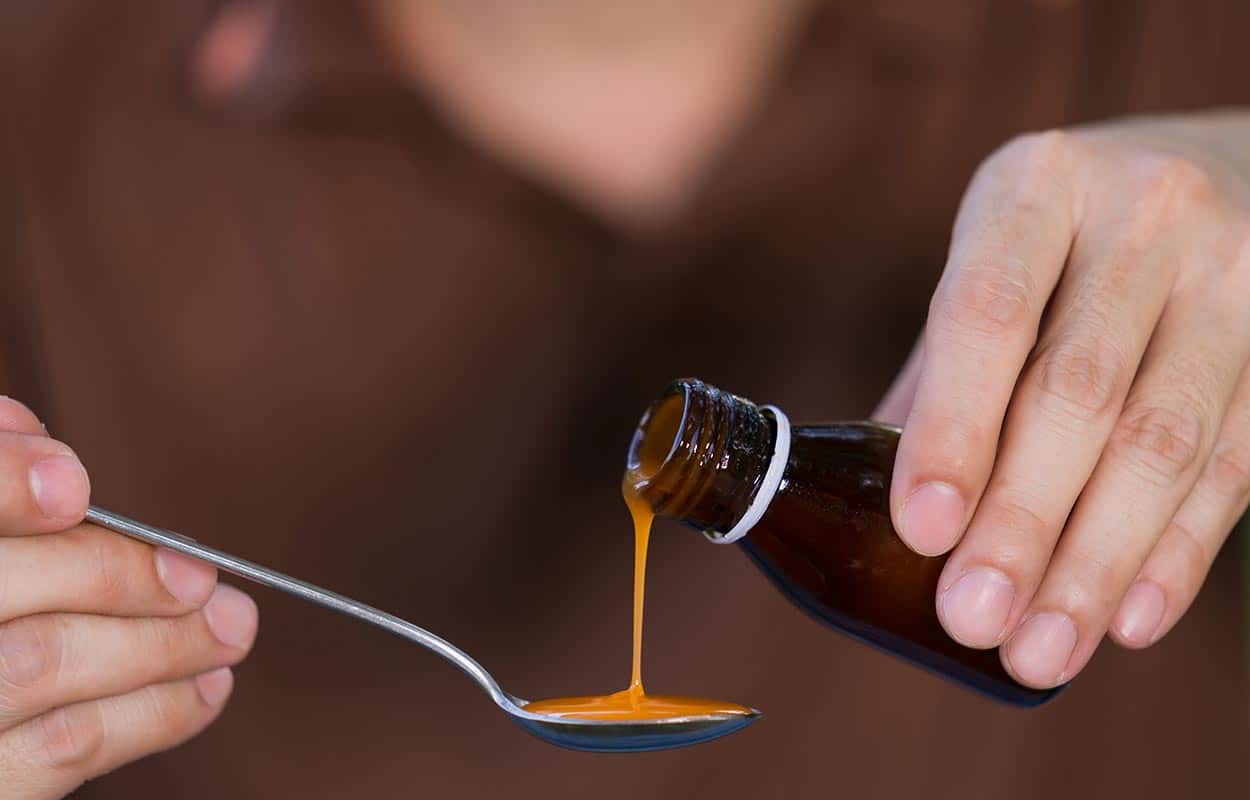Key Points
-
- The effects of NyQuil usually only last for about 6 hours, though it can remain detectable in the human body for much longer.
- Vicks NyQuil is a popular over-the-counter cough and cold syrup often used to treat short-term symptoms of the common cold or flu.
- NyQuil is not meant to be taken long-term and should be discontinued after about a week.
- NyQuil is a combination drug that contains the active ingredients acetaminophen, dextromethorphan, and doxylamine succinate.
- Common side effects of NyQuil include drowsiness, dry mouth, and blurred vision.
- More severe side effects can occur, including high fever, confusion, and upper abdominal pain.
- On a urine test, NyQuil detection (or some of its active ingredients) is possible for up to four days.
- You should avoid drinking alcohol while taking NyQuil, as it can increase its side effects.
- It is possible to overdose on NyQuil if it’s not taken as directed; overdose symptoms include dilated pupils, seizures, and vomiting.
- If you or a loved one is experiencing signs of a NyQuil overdose, call 911 and/or the Poison Control helpline at 1-800-222-1222.
- You can become addicted to NyQuil if you take it recreationally or for longer than directed.
- Signs of NyQuil addiction include cravings for NyQuil, needing more NyQuil to achieve the same effect, and experiencing withdrawal symptoms when abstaining from NyQuil.
- If you or a loved one is addicted to NyQuil or any other drug, addiction treatment and recovery support is available nearby.
How Long Does NyQuil Stay in Your System?
Some of the active ingredients of the combination drug NyQuil can remain in the system for up to 65-78 hours, but these same ingredients might be detectable through a drug test for
up to four days (or longer for a hair follicle test). [1] The precise amount of time a drug will stay in your system will depend on a number of individual factors, including your drug metabolism and how much of the substance you take.

What Is NyQuil?
NyQuil is a popular over-the-counter cold medication used short-term to treat common cold and flu symptoms. People take NyQuil to treat nighttime symptoms such as a runny nose, sore throat, body aches, and cough. The regular formulation of NyQuil contains
three active ingredients, including dextromethorphan, doxylamine succinate, and acetaminophen. [2]
NyQuil makes different formulations of its cold and cough syrup, so ingredients and dosages can vary. Some of the products include alcohol. Some popular Vicks NyQuil products include:
- NyQuil Cough, Cold & Flu
- NyQuil Cough DM + Congestion
- NyQuil Severe Maximum Strength Cough, Cold & Flu
- NyQuil Ultra Concentrated Cold and Flu Relief
- NyQuil Kids Cold and Cough + Congestion Relief
Vicks, the maker of NyQuil, also has a similar line of products called DayQuil. This line includes similar active ingredients, just without the sedative effects, making it more suitable for daytime use. If you’ve never taken NyQuil before or have a complex medical history, it could be wise to seek medical advice from a doctor before taking any of these over-the-counter drugs.
Side Effects of NyQuil
Like many OTC medications, NyQuil is associated with some
side effects, including: [3]
-
- Drowsiness or sleepiness
- Dry mouth
- Blurred vision
- Dizziness
- Trouble urinating
If these side effects become serious or last more than a few days, contact your healthcare provider.
Serious Side Effects of NyQuil
NyQuil carries the risk of liver damage, allergic reactions, serotonin syndrome, and other severe adverse reactions. Thus, some people experience more
serious side effects after taking NyQuil that may require medical attention, such as: [4]
-
- Severe dizziness
- Severe anxiety
- Faintness
- Little to no urine
- Upper stomach pain
- Loss of appetite
- Yellowing of the eyes or skin
- Dark urine
- Extreme fatigue
- Itchy skin
- Clay-colored stools
- Swelling of face, lips, tongue, or throat
- Hives or skin rash
- High fever
- Confusion
- Muscle spasms
- Rapid heart rate
How Long Does NyQuil Last?
After you take an initial dose of NyQuil, you’ll start feeling the effects within
approximately half an hour. [5]The medication effects will last for roughly six hours, so you may have to take it more than once during the night, especially if you wake up looking for symptom relief.
How Long Does NyQuil Stay in Your Urine?
Traces of NyQuil or any of its active ingredients could show up on a urine test
up to four days after your last dose.[6] Keep in mind that this is a rough estimate, since your individual test results could depend on a number of different factors. Some of these factors include:
-
- The type of NyQuil you take
- How much NyQuil you take
- How long you have been taking NyQuil
- Whether you have a faster or slower metabolism
- Any other OTC or prescription medications you’re taking
- Any medical conditions you have
Detection periods for NyQuil: How long does it take to get NyQuil out of your system?
For Nyquil to leave your system completely, it can take anywhere
from 65 to 78 hours. [7] Since Nyquil contains multiple ingredients, this estimate is based on the drug with the longest half-life. In the case of Nyquil, the drug with the longest half-life is the cough suppressant dextromethorphan. Generally, it takes about four to five half-lives for a drug to completely leave the system. Even after Nyquil has left the system, it can still be detectable by certain
drug tests that screen for this substance.
Managing NyQuil Use & Safety Warnings
NyQuil can be a relatively safe drug if you use it properly. Still, it’s best to speak to a healthcare professional about whether NyQuil is recommended for you.
Alcohol Warning
Because NyQuil contains a sedative to help you sleep when you have cold or flu symptoms, it’s not safe to drink alcohol while taking this over-the-counter cough and cold medicine. Alcohol is also a sedative, so it can increase these effects. Some NyQuil products also contain small amounts of alcohol, but there is an alcohol-free formulation you can take if you’re sensitive to alcohol or have a history of
alcohol use disorder.
Risk of Overdose
Taking more NyQuil than directed could result in a dangerous overdose. If you or a loved one is taking NyQuil, it may be important to look out for the following
symptoms of a NyQuil overdose: [8]
-
- Severe drowsiness
- Hallucinations
- Seizures
- Dilated pupils
- Blurry vision
- Jaundice
- Insomnia
- Hyperactivity
- Abdominal pain
- Vomiting
- Light-colored stools
If you notice any of these overdose symptoms, call 911 or seek emergency medical attention. You can also call the Poison Control helpline at 1-800-222-1222.
Risk of Substance Use Disorder
It’s possible to become physically or psychologically dependent on NyQuil, and this risk is higher for people who take NyQuil recreationally or for longer than directed.
Some of the signs of
substance use disorder include: [9]
-
- Experiencing cravings for NyQuil
- Taking more NyQuil than you planned to or for a longer period of time
- Continuing to use NyQuil even though it’s causing problems in your life
- Using NyQuil in risky or dangerous situations
- Spending a lot of time getting, taking, or recovering from NyQuil
- Giving up other activities to take NyQuil
- Needing more NyQuil to have the same effect (i.e., developing tolerance)
- Experiencing withdrawal symptoms when not taking NyQuil for a period of time (i.e., developing a physical dependence)
Having just two or three of the symptoms above could indicate an addiction, according to the American Psychological Association.
Addiction Treatment Solutions
Though it is rare, if you or a loved one has developed an addiction to NyQuil or any other substance, help is available. You don’t have to live your life dependent on a drug. With the
proper support and treatment from a substance use counselor or rehabilitation facility, you can break free of addiction. Help is just a call away. Start recovery by calling your physician.





